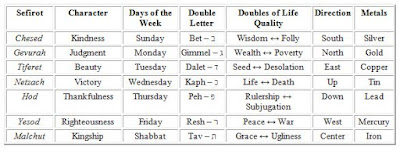Weekly Cycle of Kabbalah
Monday, March 10, 2014
“Peace and war relate both to nations and to the individual. A person can be at war or peace with himself. These letters transmit these qualities both to oneself and others” (Aryeh Kaplan).
• Sunday (Rishon) – Kindness is associated with Sunday, the first day of the week. The planetary ruler of the first hour of the day is the Sun from which the Romans gave it the name.
• Monday (Sheni) – Judgment associates with Monday. On Mondays and Thursdays, Hashem holds back some of the good light so that we may learn to return to him. In order to make up for this light, we recite the Torah portion in synagogue on those days to bring the light of God down through learning. In addition, Mondays and Thursdays are chosen for self-appointed fasts.
• Tuesday (Shlishi) – God blessed Tuesday twice in the creation story. Beauty and splendor associate with Tuesday. The energy of the day facilitates Torah learning and knowing truth.
• Wednesday (Revaee) – Wednesday associates with the upper prophecy of Moses. The energy of the day facilitates victory in undertakings and the joy of success, which is required to experience prophecy. Wednesday evenings are particularly suited for meditation for at this time the upper prophecy descends to the lower prophecy in our world.
• Thursday (Hamishi) – Thursday associates with the lower prophecy of Aaron the priest. This manifestation of prophecy is in life lessons and service to Hashem. The energy of the day is particularly suited to remind us of the need to show gratitude to Hashem and others in our life.
• Friday (Shishi) – Righteousness associates with Friday. The energy facilitates preparation for Shabbat. Towards the end of Friday, Hashem grants an extra energy to finish the work of the week.
• Saturday (Shabbat) – Shabbat begins on Friday evening following the blessing after lighting the candles or at sundown (Shkiat Hachama – setting of the sun). The Shabbat candles symbolize the menorah that will one day stand again in the Holy Temple. The candlesticks should not be moved during the entire Sabbath. Shabbat ends at Havdalah or when three stars are seen in the night sky (Tzait Hakochavim – stars go out) or 72 minutes after sunset. The blessing, “Baruch hamavdil ben koshesh l’hol” (bless the distinguishing between the holy and secular) is recited to announce the change. When we learn not to demean the secular and to honor the holy, we will recognize the partnership, and we will resolve the conflicts between the daati and hiloni (religious and secular). This is the union between Nukvah and the six sefirot of Partzuf Ben.
Observing the Shabbat is one of the keys to achieving closeness to Hashem. This is the day when Hashem releases an extra portion of blessing stored in Malchut for our world. This is similar to the extra portion of manna that the Israelites had for Shabbat while wandering in the Wilderness. We call the extra portion released from Malchut, the Shechinah that is the presence of God.


0 comments: